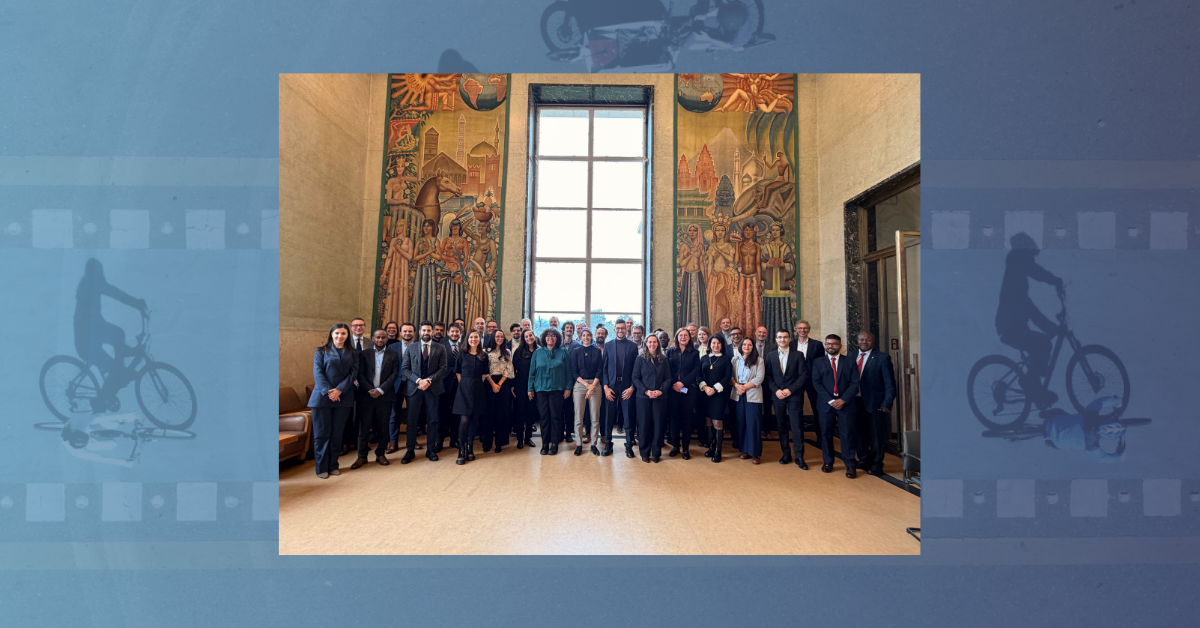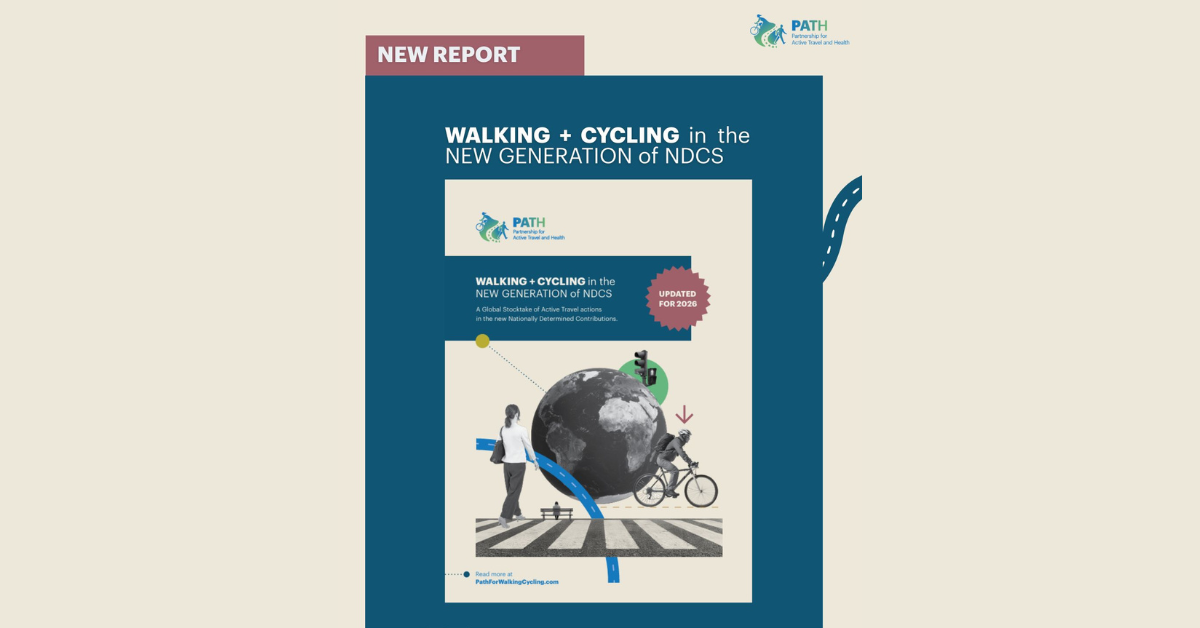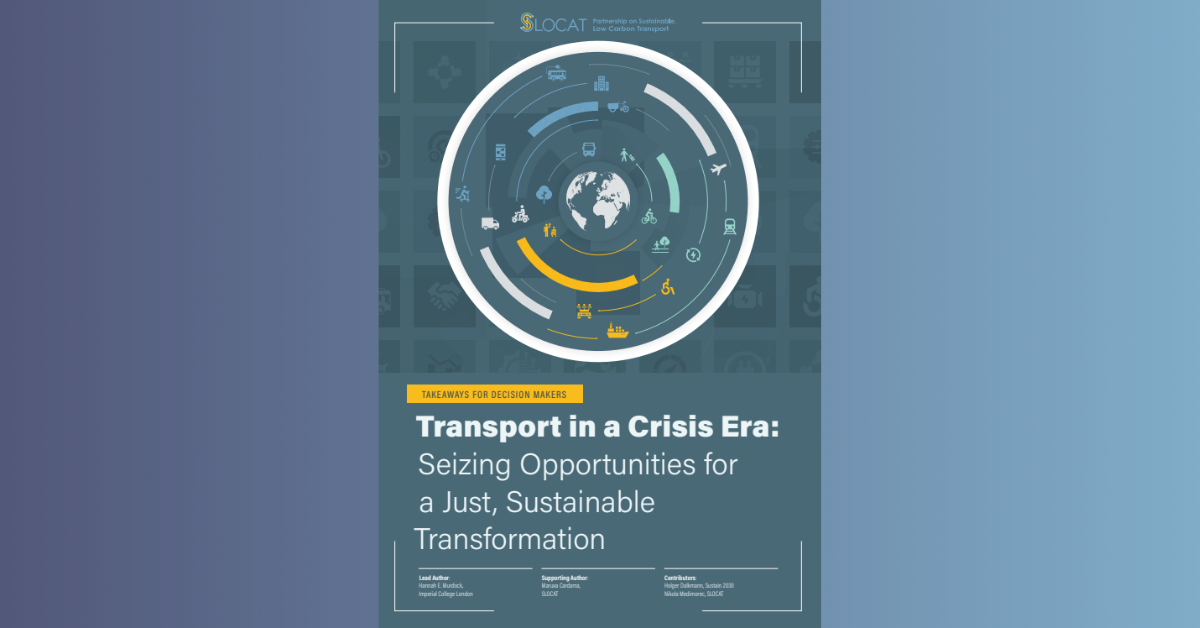-
About Us
-
Our Work & Impact
-
 Insights & Data
Insights & Data
-
 Actions & Change Makers
Actions & Change Makers
-
 Advocacy & Engagement
Advocacy & Engagement
-
 Impact Stories
Impact Stories
-
 Our Strategic Plan
Our Strategic Plan
-
 Our Vision
Our Vision
Our Work & Impact
Our Work
Our Impact
-
-
News & Resources
News & Resources
-
Partners
-
Contact Us
The Morning Commute Blogs
A blog series featuring opinion pieces on sustainable, low carbon transport

A blog series that features a range of experts and change makers who are powering the sustainable, low carbon transport revolution by advancing adequate financing to reach the scale of decarbonisation of the transport sector necessary to achieve Paris Agreement targets. Collectively, these blogs present a multi-stakeholder space for peers to exchange ideas and explore further opportunities for collaboration
Shared by Benjamin Simmons, Director of Sustainable Infrastructure, and Michail Kapetanakis, Research Analyst, International Institute for Sustainable Development (IISD)
As part of a new series of sustainable transport case studies, the International Institute of Sustainable Development (IISD) has prepared a comprehensive economic analysis* of the Non-Motorised Transport (NMT) plan in Coimbatore over the next 23 years. We found that, perhaps unsurprisingly, the project was not economically viable if valued using only conventional metrics, such as cash flows and revenue streams. Yet, when a wider range of economic, social and environmental benefits and costs are factored in, the NMT project becomes clearly investment worthy, both from an economic and a societal perspective.

Shared by Lucie Anderton, Head of Sustainability and Joo Hyun Ha, Senior Sustainability Advisor, International Union of Railways (UIC)
Financing rail projects will play a crucial role in fostering the move toward sustainable and climate-resilient transport systems and infrastructure. Energy and emissions data have consistently shown that rail transport is the least CO2-intensive motorised mobility whilst providing other benefits to society such as reducing noise, congestion, accidents and environmental pollution, which are currently not captured by pricing of railway operations.

Shared by Philip Turner, Head of Sustainable Development, International Association of Public Transport (UITP)
Public transport, in combination with active and micro mobility, is already the most climate friendly and cost-effective way to travel. But even then, the climate crisis is a shared responsibility and demands that we all do more. And the sector is stepping up.
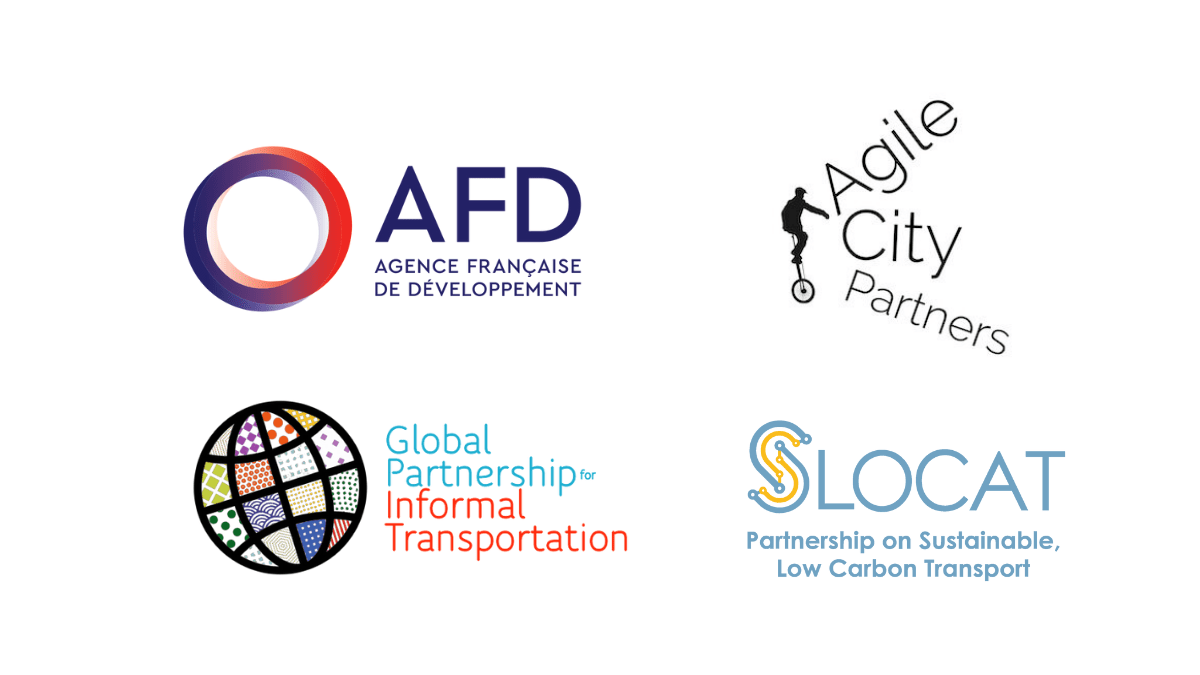
A blog series to look at informal transport as an asset and an opportunity for an inclusive Race to Zero in the Global South. This blog series was a collaboration between GPIT and SLOCAT with the support of AFD.
Reimagining the Race to Zero in the Global South: Exploring the Role of Informal Transport in Africa’s Transition Towards Inclusive, Sustainable and Decarbonised Transport by Andrea San Gil León, Founder of the Center for Urban Sustainability in Costa Rica and Co-Founder of Agile City Partners and the Global Partnership for Informal Transportation
Towards Clean, Green Popular Transport by Jacqueline M. Klopp, Center for Sustainable Urban Development
Engaging Informal Transport Operators Key to Accelerating Decarbonisation by Geofrey Ndhogezi aka Lubyanza
The Role of Data in Electrifying Informal Transport by Louise Ribet, WhereIsMyTransport
Exploring the Role of Informal Transport in Africa’s Transition Towards Inclusive, Sustainable and Decarbonised Transport by Joseph Ndiritu, Public Transport Operators Union, Kenya
Enhancing the Utility and Sustainability of Popular Transport by Wilma Nchito, University of Zambia
The Potential of Informal Transport to Provide Flexible, Low Carbon Logistics in the Global South by Omolola Madoh Gegeleso, Ladoke Akintola University of Technology
Transport Action for Achieving the Sustainable Development Goals
Sustainable, low carbon mobility is a powerful driver for positive, systemic transformation of our societies. The SLOCAT Wheel on Transport and the SDGs aims to articulate the breadth of positive interactions between sustainable, low carbon transport and mobility and the 2030 Agenda. We have identified four cross-cutting themes — Equitable, Healthy, Green and Resilient — to present these interactions.


Shared by Alison Doig, Director, Health and Climate Network, and Karl Peet, Senior Adviser, SLOCAT Partnership
“The World Health Organisation (WHO) convenes health ministries from around the world at the 75th annual World Health Assembly (WHA) in Geneva this week. Three-quarters of a century on, it’s worth reflecting on why the WHA matters for sustainable transport – specifically, why should health ministers be concerned with what happens in their countries’ transport sectors?“

Shared by Nikola Medimorec, SLOCAT Partnership, with inputs by Bianca Ryseck, Cabrel Tokam, Fatoumata Diallo, Richard Unuigboje and Robert Ambunda, SLOCAT-VREF Young Leaders in Sustainable Transport
“Compact city development and the 15-minute city planning approach are ultimately concepts embracing a comprehensive means to tackle land use, mobility and access. To implement the concept in the transport sector, the Avoid-Shift-Improve framework, which is seen as an integrated, inter-modal and balanced action framework, is an essential approach. It can unleash the full benefits of sustainable, low carbon transport for more liveable, less polluting cities. “

Shared by Suzanne Spooner, Project Manager and Knowledge Manager, AFD
“The French Development Agency undertook to make its activity be 100% consistent with the Paris Agreement, which involves financing projects promoting a long-term low-carbon transition – and excluding projects that support fossil energy production or use. In addition, 50% of AFD annual financing goes to projects that have a direct beneficial impact on the climate (climate co-benefits), through mitigation or adaptation. Considering that sustainable projects are only resilient when they also foster a “fair transition”, AFD developed a “100% social link” strategy aimed at reducing all forms of inequality and strengthening inclusion.“

Shared by Emily Hosek and Alice Yiu, SLOCAT Partnership
“The transport sector has an immense impact on our planet’s climate, and as the fastest-growing source of global emissions, the decisions that we make today about how we move people and goods (and when it is not necessary to move them at all!), are critical to the implementation of the 2030 Agenda and the achievement of the goals of the Paris Agreement. Transport should be central to conversations at the upcoming UN High-Level Political Forum on Sustainable Development (HLPF) (6-15 July 2021) and its review of progress made towards Sustainable Development Goal (SDG) 13 on Climate Action and beyond.“

Shared by Laura Lopez, Intern, EUROCLIMA+
“In 2018, the two municipalities presented a project, The promotion and development of urban cycling in Montes de Oca and Curridabat, to the EUROCLIMA+ program in order to obtain technical and financial support to build a network of approximately 30km of cycle routes. The project’s objective is to position urban cycling as a prominent mobility alternative for a wide variety of users and types of trips in the two municipalities; and is accompanied by awareness-raising and capacity-building workshops for the use of bicycles in urban areas.“
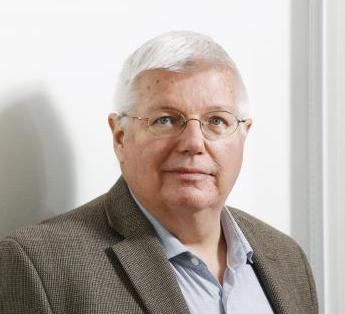
Shared by Aage Jorgensen, Program Manager, Nordic Development Fund
“Roads are a key asset for Africa. They connect villages to economic centres, people to hospitals, children to schools and goods to markets facilitating trade. A changing climate has many implications for Africa’s road connectivity. Climate change leads to an increase in frequency and intensity of fluvial and surface water flooding of roads; higher temperatures causing heat-induced damage to road surfaces; increased storm surge flooding of the road network causing damages to roads, bridges and culverts.“
Voices from Our Partners

Shared by Carolina Chantrill, Director of Sustainable Mobility, Asociación Sustentar
“Asociación Sustentar started as a group of classmates and friends who shared political science as a major and were concerned about the climate change crisis. Ten years ago, pollution and climate change was merely in agenda for the media and politics. They envision an organization capable of making a positive impact and showing the importance of contributing to a more sustainable future.“

Shared by Alexander Körner, Programme Officer, United Nations Environment Programme
“Compared to Europe or North America, per capita energy use in Africa is very low, while growth rate of energy use is high. Over the past ten years, total primary energy demand on the continent grew by one third. The transport sector is one of the main sectors responsible for this growth, with demand for transport fuels growing by almost 50% between 2010 and 2020. Based on current trajectories and policies, transport energy use on the continent is anticipated to grow by another two thirds by 2040.“

Shared by Jill Duggan, Executive Director, Environmental Defense Fund Europe
“Despite our track record and depth of in-house expertise, we know that the key to making real change happen is finding great partners. We measure success not only by what we’re able to achieve but on what we’re able to help others get done. We’re a relatively new partner of SLOCAT, but we have been impressed. We joined because we wanted to work with others, to be useful and additional, as we build up our work in Europe.“
Catalysing the Transformation of Transport Now

Shared by Nikola Medimorec, SLOCAT Partnership
The NDCs Hall of Fame by SLOCAT puts the spotlight on the major transport strengths and issues in the second generation of Nationally Determined Contributions (NDCs) submitted so far by countries in the framework of the Paris Agreement on Climate Change. By doing this, we aim to illustrate how countries can enhance the transport dimension of their NDCs and hence enable passenger and freight transport systems for equitable, decarbonised, resilient pathways.
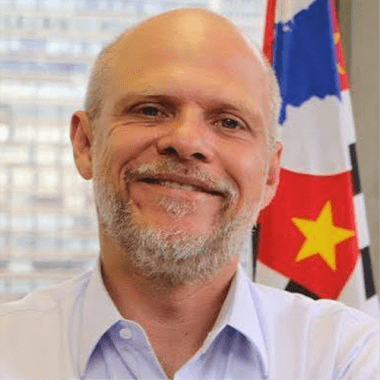
Shared by Sergio Avelleda, Director of Urban Mobility, WRI Ross Center for Sustainable Cities
“Brazilian cities have been avoiding an urgent debate: charging car users the cost of public infrastructure and allocating these resources for public transportation.”

Shared by Seble Samuel, Co-founder and Co-organiser of Menged Le Sew, and Iman Abubaker, Urban Mobility Project Manager at WRI Africa Ross Center for Sustainable Cities
“Overcoming the hurdles of land use planning and road safety to mainstream active mobility across urban Ethiopia, and amplifying opportunities by harnessing digital tools, financial incentives, infrastructure changes and meaningful community engagement to promote cycling culture, can help accelerate a transition for active mobility across Ethiopian cities.”

Shared by Henrik Nolmark, Director, Volvo Research and Educational Foundations
“We need to encourage young leaders and experts to listen and learn beyond their comfort zones. Hanging with your peers, following your well-known information and learning channels is absolutely fine, but to deepen our understanding of context and how to drive transition we also have to meet people with other perspectives.”

Shared by Sheila Watson, Deputy Director, FIA Foundation
“We in the sustainable mobility community know what needs to be done. We have been arguing for it for years. This is our moment to bring all of that knowledge to bear, and to press the case to governments, policymakers and the public alike that a sustainable city, with clean and low carbon mobility is one that works for ourselves, our communities and our planet.”
COVID-19 and Mobility: Reflections from the SLOCAT Board of Directors

Shared by Kalpana Viswanath, Co-Founder and CEO, Safetipin
“Not everyone can work from home – it is the privilege of certain kinds of occupations. Factory workers, domestic workers, health workers, street vendors, the hospitality sector – in reality all blue collar workers as well as those in the informal sector, will need to venture out of their homes to be able to earn money and survive.”

Shared by Aimee Gauthier, Chief Knowledge Officer, ITDP
“Now is the moment when we need to come to terms with transportation as political… We as a sector have had a harder time coming to terms with transportation as values, as power dynamics writ large through our cities, as manifestations and perpetuators of historical and current inequities, including colonialism, racism, xenophobia, etc.”

Shared by Sergio Avelleda, Director of Urban Mobility, WRI Ross Center for Sustainable Cities
“Public budgets must consolidate the amounts spent on individual motorised transport. This is the first step to qualify the discussion on funding measures for public transport based on charging the use of cars and motorcycles. Expenses with individual motorised transport should be presented in a single budget line so as to give visibility and transparency to the expenditures.”

Shared by François Davenne, Director General, UIC
UIC has launched the COVID-19 Task Force, which held its kick-off meeting by video conference on 5 March 2020. Since then, and in the spirit of sharing current practices, UIC members and partner organisations have provided the Task Force with relevant information leading to the publication of a series of guidance documents.

Shared by Rana Adib, Executive Director, REN21
“COVID-19 forcibly separated us, but it should also bring us together: both the energy and transport sectors need to cooperate to seize this unusual moment, so that we put in place innovative strategies and policies that allow people and goods to be transported cleanly and efficiently – and better than before.”

Shared by Mohammed Alsayed, Manager, Public Private Partnership Division at Islamic Development Bank, and published in the IsDB SDG Digest Special Edition on COVID-19
The Islamic Development Bank (IsDB) allocates US$ 2.3 billion for its Group Strategic Preparedness and Response Programme for COVID-19 pandemic which aims to support Member Countries’ efforts to prevent, contain, mitigate and recover from the impacts of the pandemic.

Written by Tsu-Jui Cheng, on behalf of Gino Van Begin, ICLEI Secretary General
“Public transport is keeping cities moving through the crisis, getting essential workers to their jobs and supporting essential services. However, this is high risk work for drivers and operators even as they step up use of personal protective equipment and hygiene measures.”

Shared by Bronwen Thornton, SLOCAT Board Chair and Walk21 CEO
“Our shoes are the essential low carbon ‘vehicles’ that need priority over other modes, to get the world back on its feet and provide the foundation for the recovery of all other sustainable mobility and more liveable urban streets and public spaces for everyone.”



